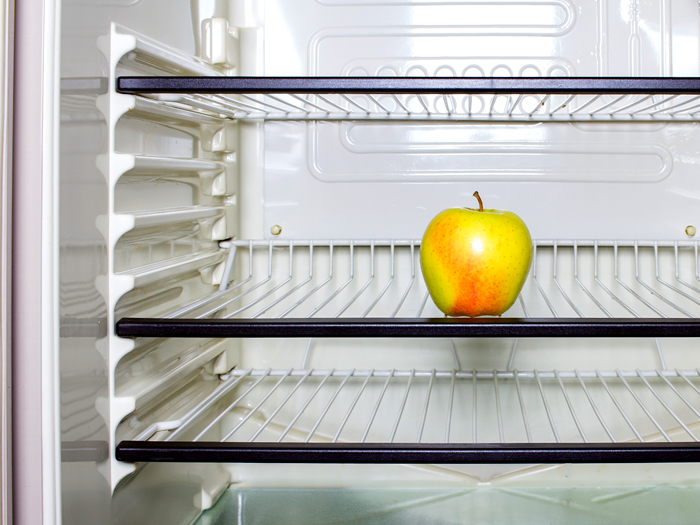14 Foods You Don’t Need to Refrigerate (But Probably Are)
Learn the right way to store your groceries for optimal shelf life, taste, and quality.

If you’re like most people, when you come home from the grocery store, you put away foods in their usual spots. And if you’re the cautious type, you may play it safe and stuff most fresh items in the refrigerator. After all, if it’s working well, it does a pretty good job of keeping bacteria at bay.
Must-refrigerate foods include perishables like meats and dairy. “But it also includes all leftovers—meaning anything that’s been cooked—and any produce item that’s been sliced or peeled,” says Colleen Lindholz, president of pharmacy and The Little Clinic at Kroger Co.
That’s because the extra handling of cooked or prepared foods introduces new bacteria, she explains. “It’s important that they are kept in the fridge—always at or below 40°F for proper safety.”
With that warning out of the way, here’s another reality: A lot of the food most people store in the refrigerator doesn’t actually need to be there.
And while there’s no harm in refrigerating something that doesn’t need it from a food safety standpoint, “there are some foods you want to avoid sticking in the fridge for overall quality,” Lindholz says.
Here are 14 foods you don’t need to refrigerate, plus the right way to store each for optimal taste and quality. Just remember: This advice applies only to whole, uncut food. If you slice an apple or peel an orange and don’t plan to eat it immediately, you should put it in a container or wrap it tightly in plastic, and then store it in the fridge.
1. Alliums: Onions, Shallots, and Garlic
Onions, shallots, and garlic can become moldy when exposed to the high humidity of the refrigerator. Store them in a relatively cool, dry place in your pantry, like a cabinet or basket that’s not exposed to light.
Why you may want to add more alliums to your diet: Their benefits go way beyond adding flavor. Check out five surprising reasons to eat more garlic.
2. Apples
Apples will taste best when kept at room temperature on the countertop. Be careful not to jostle them around too much in a fruit basket, which can cause bruising that might make the fruit feel mealy or taste sour.
3. Avocados
Avocados are usually sold unripe and hard, which means you need to wait a few days for them to ripen and soften before eating them.
Refrigeration will slow down this ripening, so it’s best to keep avocados at room temperature. They’ll ripen fastest when stored in a folded paper bag, but it’s fine to store them in an open container on the countertop.
4. Bananas
Like avocados, bananas are often sold unripe. Store them at room temperature on your countertop until they ripen. If they get too ripe and blacken before you can eat them, peel each banana and store them all in an airtight container in the freezer to use in baked goods, like banana bread, or in blended smoothies.
5. Basil
Basil leaves are delicate and can turn black when exposed to cold temperatures. Store your basil in a glass jar on the countertop, with the stems submerged in water.
Not sure how to use basil? Try this recipe: Basil Balsamic Salmon Quinoa Salad.
6. Bell Peppers
Bell peppers can be stored at room temperature on your countertop. But if your peppers start to get wrinkly or soft, and you don’t plan to eat them for a few more days, go ahead and put them in the fridge.
7. Bread
Refrigerating bread causes it to go stale faster, so your best bet is to keep it in a breadbasket or box that blocks light but isn’t airtight.
The exception: If you buy frozen bread, keep it frozen, and thaw by broiling or baking in the oven just before you eat it.
8. Citrus: Oranges, Lemons, Grapefruit
Thick citrus skins protect them from bacteria and sunlight, so you should store them at room temperature on the countertop.
9. Honey and Maple Syrup
Sugar is a preservative, and since honey and maple syrup are pure sugar, they’ll do fine stored in an airtight container at room temperature. That usually means keeping them in their original bottles in the pantry or a cabinet.
The exception: If your maple syrup says to refrigerate after opening, follow those directions.
10. Melons
Melons have a thick protective skin, so it’s fine to store them at room temperature. Remember though: Once you cut a melon, you’ll need to refrigerate it.
11. Potatoes and Sweet Potatoes
Like alliums, potatoes can actually mold faster in the high humidity of the fridge. Similarly, they should be stored in a cool, dry, dark place in your pantry.
One reason to love sweet potatoes: They’re versatile! Check out this seven-day meal plan using just 10 ingredients.
12. Stone Fruits: Peaches, Plums, or Cherries
Stone fruits are fruits with flesh or pulp enclosing a stone, or pit, in the middle. They usually need to ripen a bit before you eat them—a soft, juicy peach is so much better than a crunchy, less-sweet one—so store them on the countertop at room temperature.
If stone fruits start to get too soft and wrinkly before you can eat them, you can extend their life a little bit by storing in the fridge.
Subscribe to our newsletter
It's quick and easy. You could be one of the 13 million people who are eligible.
Already a member? Click to discover our 15,000+ participating locations.
Follow Us
13. Tomatoes
Tomatoes have a far better flavor when stored at room temperature on the countertop. They may even become mealy if you store them in the fridge.
14. Tropical Fruits
Like melons, the thick skin of tropical fruit like pineapple, mango, and papaya is enough defense against bacteria and light. Store these fruits at room temperature.
A simple way to use mango: with cottage cheese and coconut for a healthy, delicious snack you can make at home.
Bonus! 4 Foods You Should Always Refrigerate
On the flip side, Lindholz notes that there are certain foods you should definitely refrigerate, even if some sources tell you otherwise.
1. Berries and Grapes
Berries are more delicate than other fruits. They can get soft and moldy at room temperature, especially if they were refrigerated before sale. And even if they’re not stored in the refrigerator case at the store, most berries and grapes are transported in refrigerated trucks.
Store them in a ventilated container (one with holes at the top or bottom) in the fridge to make them last as long as possible.
2. Butter
This is a bit of a gray area, but Lindholz recommends storing butter in the fridge. While the high fat content acts as a preservative, butter also contains milk solids that can spoil at room temperature.
3. Eggs
You might’ve heard eggs aren’t refrigerated in Europe, and that those eggs taste better. While this may be true, there’s more to the story: Eggs are farmed differently in Europe, and they’re sold by grocery stores at room temperature.
In the United States, the law requires that eggs be refrigerated for sale to reduce risk of salmonella and other foodborne illnesses. Once the eggs have been refrigerated, they can’t be stored at room temperature. So if you’re buying eggs from a grocery store here, keep your eggs in the fridge.
4. Ketchup and Mustard
It’s fine to store unopened condiments like ketchup and mustard at room temperature. But once opened, Lindholz recommends refrigerating them since they’ve been exposed to bacteria in the air and possibly from foods you’ve drizzled them onto.
Take Your Favorite SilverSneakers Classes Online!
SilverSneakers members can access live fitness classes and wellness workshops through SilverSneakers LIVE. See the latest schedule and RSVP for classes here.
Not a member? If you have a Medicare Plan, it may include SilverSneakers—at no additional cost. Check your eligibility instantly here.





